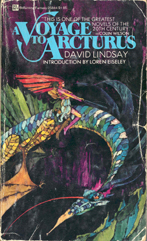David Lindsay
Scottish fantasy novelist David Lindsay fits into the genre like a square peg in a round hole.
Although I've heard that C. S. Lewis' science fiction was influenced by him, he doesn't relate closely to anything that came before or went after, and, arguably, his only widely-known work is nearer to science fiction than fantasy.
His basic plot of an Earth man being mystically transported to an alien planet and meeting a succession of bizarre aliens does recall Burroughs.
But Lindsay's philosophical musings and the near lack of action remove Arcturus as far as possible from the sword & planet genre.
Arcturus was a complete commercial failure, and despite being reprinted a few times (a 1963 Macmillan version sold pretty well), it wasn't really widely recognized until the 1968 Ballantine Adult Fantasy edition, which was perfectly timed - Lindsay's far-out scenery, bizarre head trips, and muddled navel gazing were all very much in tune with that era.
After publishing Arcturus, Lindsay put out another three books over the next 12 years, all of which were equally unsuccessful.
Although Gollancz reprinted the first of them (The Haunted Woman) in the 40s, the others are almost impossible to get - first editions can cost thousands of dollars.
But apparently they're just not as interesting as Arcturus, having more (but not completely) Earth-bound settings.
And at least a couple of them are supposedly even more dense.
|
 A Voyage To Arcturus (1920) A Voyage To Arcturus (1920)
Transported to a planet filled with bizarre landscapes and creatures, an Earth man wanders on a spiritual journey.
He encounters a series of mostly telepathic, low-tech aliens one or two at a time, most of whom quickly end up dead.
Everything is an allegory for a Big Idea: Perception, Delusion, Jealousy, Compassion, Sin, Love, Worship, Male vs. Female.
What Lindsay seems to be driving at is that Life is Will thwarted by Pleasure.
No, you don't have a Will to have Pleasure; everything is governed by a universal Will that leads to Pain.
Uh, been reading a little too much Schopenhauer, have we now?
You can get frustrated with the book pretty easily, actually.
Our hero Maskull seems like a blank slate, letting the aliens play with his emotions and never really taking his own philosophical position.
The plot, like Maskull, seems utterly aimless.
The characters seem wooden and take unjustifiably extreme actions.
The dialogue is confusing and abstract.
The violence is perfunctory and unexpected.
But you know, it's so swift-moving, whacked out, and hallucinatory, that this completely unique novel is entertaining from start to finish, just as long as you check your conventional standards for fiction at the door.
(JA)
|

|
|
|

